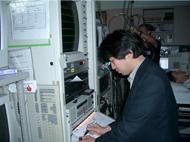
Credit: Dr. Shigeki Shibata
Participating in exercise 4-5 days per week is necessary to keep your heart young, according to new research published in The Journal of Physiology. These findings could be an important step to develop exercise strategies to slow down such ageing.
The optimal amount of exercise required to slow down ageing of the heart and blood vessels has long been a matter of vigorous debate. As people age, arteries – which transport blood in and out of the heart – are prone to stiffening, which increases the risk of heart disease. Whilst any form of exercise reduces the overall risk of death from heart problems, this new research shows different sizes of arteries are affected differently by varying amounts of exercise. 2-3 days a week of 30 minutes exercise may be sufficient to minimise stiffening of middle sized arteries, while exercising 4-5 days a week is required to keep the larger central arteries youthful.
The authors performed a cross-sectional examination of 102 people over 60 years old, with a consistently logged lifelong exercise history. Detailed measures of arterial stiffness were collected from all participants, who were then categorised in one of four groups depending on their lifelong exercise history: Sedentary: less than 2 exercise sessions/week; Casual Exercisers: 2-3 exercise sessions per week; Committed Exercisers: 4-5 exercise sessions/week and Masters Athletes: 6-7 exercise sessions per week. (NB: an exercise session was at least 30 minutes).
Upon analysing the results, the research team found that a lifelong history of casual exercise (2-3 times a week) resulted in more youthful middle sized arteries, which supply oxygenated blood to the head and neck. However, people who exercised 4-5 times per week also had more youthful large central arteries, which provide blood to the chest and abdomen, in addition to healthier middle sized ones.
The fact the larger arteries appear to require more frequent exercise to remain youthful will aid the development of long-term exercise programmes. They also enable the research team to now focus on whether or not ageing of the heart can be reversed by exercise training over a long period of time.
The research may have been limited by the fact that individuals were allocated to groups based on past exercise frequency, as opposed to other components of exercise programmes such as intensity, duration or mode, all of which could have large impacts on vascular adaptations. Furthermore, additional, unmeasured factors such as dietary intake and social background could influence arterial compliance indirectly through reduced adherence, or by non-exercise related means.
Benjamin Levine, one of the authors of the study, is excited to investigate this in the future:
"This work is really exciting because it enables us to develop exercise programmes to keep the heart youthful and even turn back time on older hearts and blood vessels. Previous work by our group has shown that waiting until 70 is too late to reverse a heart's ageing, as it is difficult to change cardiovascular structure even with a year of training. Our current work is focussing on two years of training in middle aged men and women, with and without risk factors for heart diseases, to see if we can reverse the ageing of a heart and blood vessels by using the right amount of exercise at the right time".
###
Media Contact
Andrew Mackenzie
[email protected]
020-726-95728
@ThePhySoc
Related Journal Article
http://dx.doi.org/10.1113/JP275301





